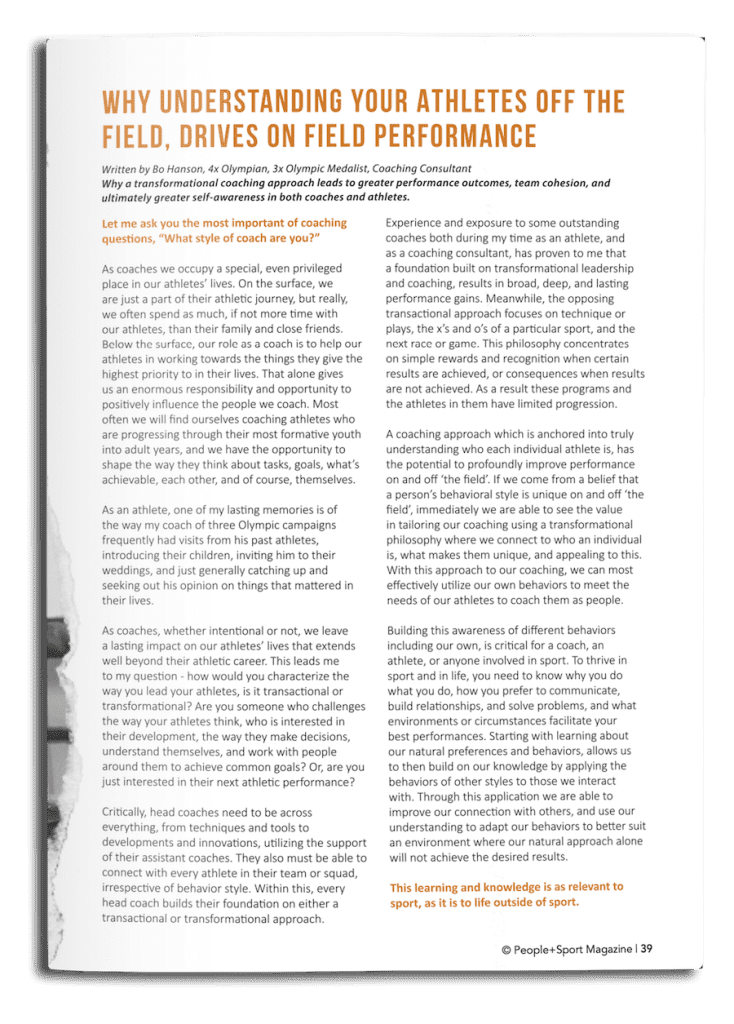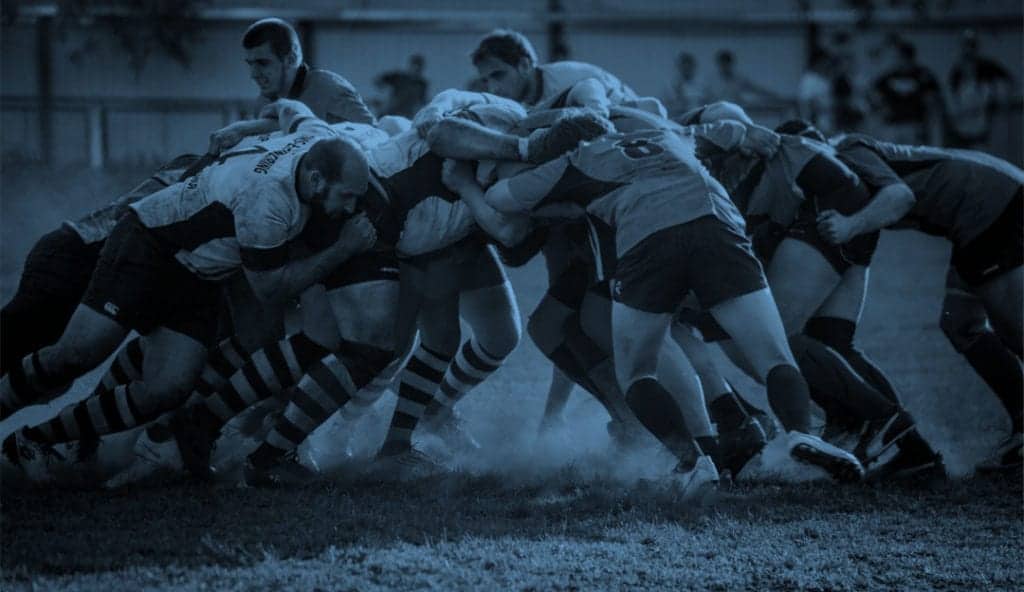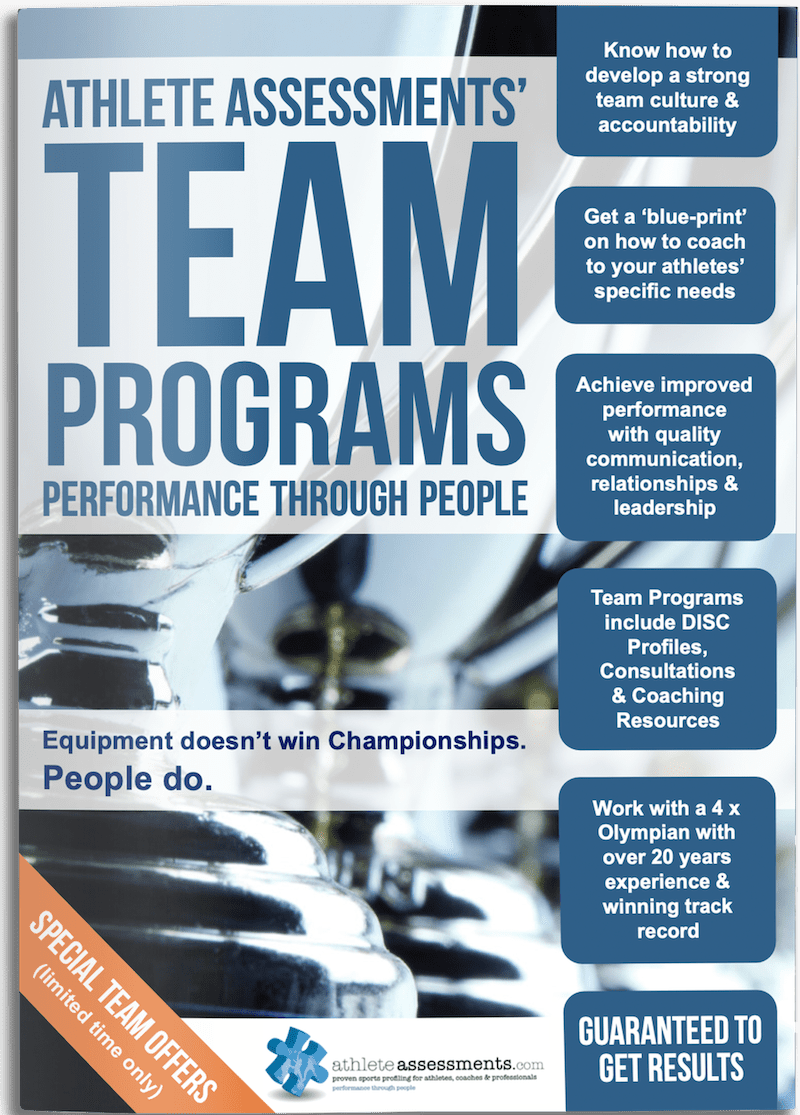Let me ask you the most important of coaching questions, “What style of coach are you?”
As coaches we occupy a special, even privileged place in our athletes’ lives. On the surface, we are just a part of their athletic journey, but really, we often spend as much, if not more time with our athletes, than their family and close friends. Below the surface, our role as a coach is to help our athletes in working towards the things they give the highest priority to in their lives. That alone gives us an enormous responsibility and opportunity to positively influence the people we coach. Most often we will find ourselves coaching athletes who are progressing through their most formative youth into adult years, and we have the opportunity to shape the way they think about tasks, goals, what’s achievable, each other, and of course, themselves.
As an athlete, one of my lasting memories is of the way my coach of 3x Olympic campaigns frequently had visits from his past athletes, introducing their children, inviting him to their weddings, and just generally catching up and seeking out his opinion on things that mattered in their lives.
As coaches, whether intentional or not, we leave a lasting impact on our athletes’ lives that extends well beyond their athletic career. This leads me to my question – how would you characterize the way you lead your athletes, is it transactional or transformational? Are you someone who challenges the way your athletes think, who is interested in their development, the way they make decisions, understand themselves, and work with people around them to achieve common goals? Or, are you just interested in their next athletic performance?
Critically, head coaches need to be across everything, from techniques and tools to developments and innovations, utilizing the support of their assistant coaches. They also must be able to connect with every athlete in their team or squad, irrespective of behavior style. Within this, every head coach builds their foundation on either a transactional or transformational approach.
Experience and exposure to some outstanding coaches both during my time as an athlete, and as a coaching consultant, has proven to me that a foundation built on transformational leadership and coaching, results in broad, deep, and lasting performance gains. Meanwhile, the opposing transactional approach focuses on technique or plays, the x’s and o’s of a particular sport, and the next race or game. This philosophy concentrates on simple rewards and recognition when certain results are achieved, or consequences when results are not achieved. As a result these programs and the athletes in them have limited progression.

A coaching approach which is anchored into truly understanding who each individual athlete is, has the potential to profoundly improve performance on and off ‘the field’. If we come from a belief that a person’s behavioral style is unique both on and off ‘the field’, immediately we are able to see the value in tailoring our coaching using a transformational philosophy where we connect to who an individual is, what makes them unique, and appealing to this. With this approach to our coaching, we can most effectively utilize our own behaviors to meet the needs of our athletes to coach them as people.
Building this awareness of different behaviors including our own, is critical for a coach, an athlete, or anyone involved in sport. To thrive in sport and in life, you need to know why you do what you do, how you prefer to communicate, build relationships, and solve problems, and what environments or circumstances facilitate your best performances. Starting with learning about our natural preferences and behaviors, allows us to then build on our knowledge by applying the behaviors of other styles to those we interact with. Through this application we are able to improve our connection with others, and use our understanding to adapt our behaviors to better suit an environment where our natural approach alone will not achieve the desired results.
This learning and knowledge is as relevant to sport, as it is to life outside of sport.
DISC profiles are the most efficient and thorough path for achieving this level of self-awareness. Athlete Assessments’ DISC profiles are unique and specifically tailored to sporting environments and the demands of particular roles within sport with our CoachDISC, AthleteDISC, and Sports ManagerDISC. Everyone who completes a DISC Profile receives a 40-page personalized report that details your natural and adapted styles within the context of your role. Learn more about Athlete Assessments’ DISC profiles.
While a DISC profile is not ‘all knowing’, it will tell you how somebody behaves in their environment. For example, people who resolve challenges and problems directly, score high in the ‘D’ or Dominant behavior style, and people who draw their energy from interacting with the people around them will score high in the ‘I’ or Influence style, both are typically fast paced and make decisions quickly. In competition, this makes them a spontaneous player – they play what they see and create opportunities.
The dual benefit of completing a DISC Profile not only lies in the intellectual understanding developed through reading your DISC report, but also in the practical aspect of discussing your report and profile with others. Having conversations about your profile not only allows you to realize your behaviors in real time, but also those of who you are communicating with. You will see the different DISC profile behaviors you’ve just been reading about, come to life.
A great example of this is a team I was debriefing their profiles with recently. Throughout, I was able to highlight the team members’ individual profiles through the actions that came naturally to them throughout the session together. This created a ‘lightbulb’ moment for these players as they could see a direct correlation between their DISC Profiles, and the behaviors they were naturally exhibiting as we did various activities and had debriefs.
By not understanding people you miss opportunities to coach or play alongside them better. Just knowing how to play with people to maximize the benefits of their preferred behaviors is a huge advantage.
Increasing self-awareness in your athletes provides them with the tools to develop their decision making capabilities, knowing how they naturally weigh up options is critical, before they can undertake strategies to increase the speed and quality of their decision making.
One particular coach we work with, was comparing his thoughts before and after DISC, sharing that before they understood their athletes’ natural behaviors, they wondered why some athletes adopted their coaching more successfully than others. They would conclude that success developed out of a greater commitment level in a particular athlete, however the coach now has the skills and tools to identify an athlete’s natural style. In turn, they can now adapt their delivery of coaching messages to suit an athlete’s preferred learning and understanding. They now achieve more success with a greater variety of athletes, understanding the way they learn, what motivates them, and which practice or competition environments suit them best.
If you haven’t already guessed, my DISC profile states I’m a high ‘D’. What this meant for me as an athlete was most obvious when we were interviewed in the lead up to an Olympics. The commitment is the same across all high-performance sport; so we were training about 16 times a week, on and off the water, and in interviews journalists would ask, “Why do you do it?” My answer was always, “I just want to win a gold medal.” It was really simple. I was thinking – isn’t it obvious? But then my team members would be asked and they stated things like, “I love being at the club and it’s really fun. Rowing is really enjoyable. And I love the people…” I was looking at these guys thinking at some stage you better start talking about how much you want to win a medal, but it was never part of it. It’s not that they didn’t want to win a medal, but they had other things that they would derive enjoyment from. Different things motivate and reward different athletes, as a coach it’s imperative to know and understand these drivers, and not to judge them because they are different to your own.
I have seen extremely knowledgeable and proficient coaches limit themselves and the people around them with a transactional approach. As always, if there’s anything we can help you with just reach out.
LOVE THIS ARTICLE?
DOWNLOAD YOUR FREE, PRINTABLE PDF COPY BY FILLING OUT THE FORM BELOW!

Where to from here?
If you loved this article and are keen to discover more on this topic, check out Bo’s feature episode on The Hardwood Hustle Podcast here.
And if you’d like to learn more about how Athlete Assessments’ DISC Profiles can benefit you and your team, click here. We would love to provide any information about the way Bo Hanson and Athlete Assessments’ programs and services can add to your program or practice, just reach out and contact us.
Recommended Articles
The skill of decision making is closely linked to problem solving. For some athletes, making the right decisions at the right time is a well-developed skill, whilst other athletes find this process more challenging. Like any critical skill, the key to developing an individual’s decision making is to practice. So, where should an athlete practice their decision making? The answer is in training.
Every time an athlete, coach or team strives to better their performance, they analyze themselves in action, identify areas to improve upon and make plans for change...
Understanding the importance of sport and exercise psychology is paramount to getting better results on the field, in the pool or on the court. Often though, coaches find the topic daunting and therefore put it in the “too hard” basket. Other coaches employ the services of a sport psychologist to assist their athletes and miss important benefits of a holistic coaching approach. In this article, we define what sport psychology is and what aspects are best incorporated into training and competition day by the sports coach.









